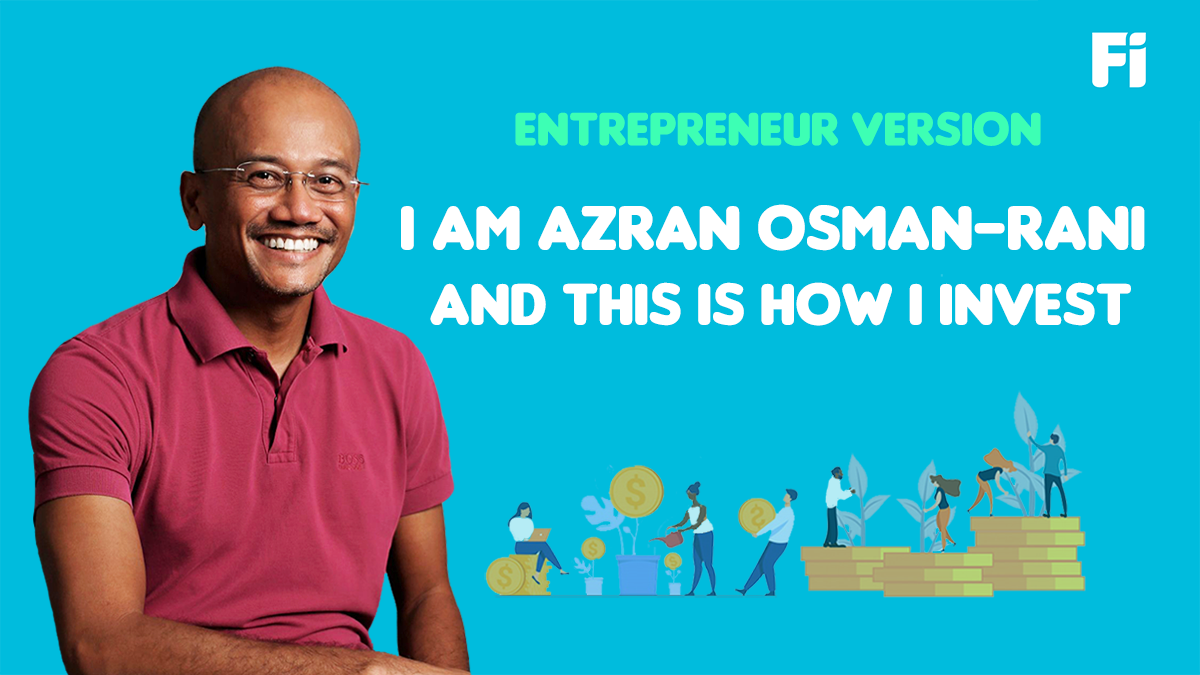
Hi, I’m Azran Osman-Rani and this is how I invest.
I build businesses that try to challenge industry status quo by making services much more accessible, affordable and convenient for the mass market segment, and then scaling regionally. I’m currently the CEO and co-founder of Naluri, a digital therapeutics company that helps those at risk of chronic conditions like diabetes, heart diseases and cancer, and those wrestling with mental health, to get behavioural coaching and psychological support to achieve quantifiable improvements in their health and wellbeing.1. What is your best investment and worst investment?
My best investment was my financially-worst investment! When I took on the role as founding CEO of AirAsia X, I invested cash to become a shareholder to have full alignment with other investors – not just through stock-options. I invested a lot more cash at our IPO six years later at the IPO price, to again have the same exposure as our IPO investors. Unfortunately, due to three major aviation disasters in the following year, the share price collapsed and I had my entire holding wiped out.
Although it was financially excruciating, it was also the most valuable investment I made. I learned so much about starting a business – from pitching a business plan to raise over $100 million capital from investors, applying for licenses and building a team from scratch, and growing it to an IPO six years later at a $1 billion valuation – and in the process overcome global financial crises, natural disasters, and restrictive regulatory barriers. This invaluable experience has given me the courage, knowledge and humility to keep on building new businesses.
2. What was your first-ever investment (and how did that go)?
That would be to put the down payment on a house. I started my career in Singapore, and for the first two years, I only rented a room that had a mattress. No bed, no desk. By saving up, I was able to afford that down payment on a house back in Malaysia. We sold it later after staying there for two years, at a decent 10% annual return, after taking into account all the interest paid.
3. Your investment no-nos (why not and what happened)
I don’t invest in property other than my own residence because of the effort to look for tenants and then having to manage tenants. I’ve tried it before, and it’s not worth the peace of mind.
Similarly, I have not invested in individual stocks for over 15 years. I once tried to build my own portfolio of stocks, and I spent a lot of time educating myself about both fundamental and technical analysis. While I made some great stock picks, they were balanced out by other poor selections. After three years, my portfolio did not beat the market index.
I learned that it’s not worth trying to manage my own portfolio and compete with professional fund managers that monitor the market every single day. I’m now a big believer in unit trusts despite all the fees involved, because over more than 10 years, the fees are negligible compared to the value of a professionally managed portfolio, and without a shadow of a doubt, the strength of my financial net worth over the last 25 years of my professional life, has been from unit trust investments.
And I stay away from crypto-currency. Without any actual real life applications of crypto-currencies, it is just financial speculation, and no better than gambling.
4. What is your context for investing?
One of the best things I did more than five years ago, was to work with a professional financial planner. We worked on defining my life goals and my values, as a compass on how I make life decisions. Financial decisions are a means of achieving these life goals.
Through reflection, I learned that I’m primarily motivated by curiosity to learn new things and to build solutions that would help the mass market segment in Asia get access to services that were available only to upper segments of society. It has been a consistent motivator to define a long-haul low-cost airline model to make travel to faraway destinations much more affordable, to make television entertainment more convenient and at a fraction of the cost of a cable or satellite subscription, and now with healthcare.
I’ve also learned that building new businesses is very hard. Things don’t go according to plan, and part of having the mental resilience to handle extreme business pressure comes from financial resilience of a good financial plan – that includes having sufficient liquid investments and insurance protection to take care of any downside risks and not affect my family’s well being if the businesses that I build, were to collapse.
I’m incredibly passionate and energized about building Naluri, because it not only taps into a massive underdeveloped market opportunity with chronic disease and mental health care, developing state-of-the-art artificial intelligence and machine learning tools that fuel my curiosity, but it also is about helping so many people transform their lives when they become healthier.
5. Azran’s investment philosophy and approach
My main life goal is to still lead a productive and healthy life at the age of 100! I’m a keen student of the science of longevity and human performance. I believe that humanity will see so many advances in medical care, including gene editing and personalized medication at the DNA, microbiome and lifestyle level. We will also unlock much more human performance through improving mental wellbeing as we understand how to manage our thoughts and feelings, which in turn directly affects our physical health and strengthens our immune system.
So, my investment philosophy and time-horizon is Ironman-triathlon long! I believe the old model of studying for the first twenty years of your life, and then working for forty years, and hopefully have enough to retire for the final twenty years of life is outdated. Human lifespans will increase much more than what we can save up for. At the same time, technology is changing at such a rapid rate, that how we will earn income will also fundamentally change every 5-10 years. That means, we need to keep reinventing ourselves, investing to build new skills and expand our professional networks. We also need to keep actively managing our health so that we have the optimism, curiosity and resilience to keep going for many more decades.
As I approach my mid-century mark, I have never been more excited for the opportunities that lie ahead in my ‘second-half’!
Check out Azran's sharing on our previous webinar "Financial Planning for Entrepreneurs"
Follow Azran Osman-rani:
LinkedIn, Website, Facebook, Twitter, Instagram, YouTube, Naluri Website
About “This is How I Invest” - As Fi Life’s motto is “Buy Term (Term Life Insurance) & Invest the Rest”, this series features how different personalities “Invest the Rest.”
Subscribe to our newsletter for more content on Personal Finance and Investment.
